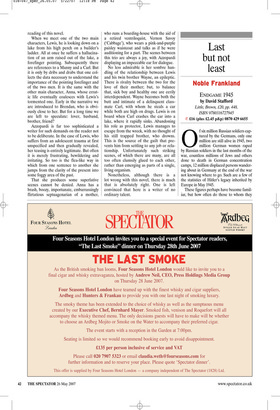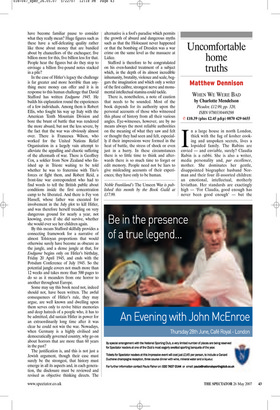Last but not least
Noble Frankland
ENDGAME 1945 by David Stafford
Little, Brown, £20, pp. 448, ISBN 9780316727945
✆ £16 (plus £2.45 p&p) 0870 429 6655 Of six million Russian soldiers captured by the Germans, only one million are still alive in 1945, two million German women raped by Russian soldiers in the last months of the war, countless millions of Jews and others done to death in German concentration camps, 12 million displaced persons wandering about in Germany at the end of the war not knowing where to go. Such are a few of the statistics of Hitler’s legacy inherited by Europe in May 1945.
These figures perhaps have become familiar, but how often do those to whom they have become familiar pause to consider what they really mean? Huge figures such as these have a self-defeating quality rather like those about money that are bandied about by chancellors of the exchequer; five billion more for this, five billion less for that. People hear the figures but do they stop to envisage a billion five-pound notes stacked in a pile?
In the case of Hitler’s legacy the challenge is far greater and more horrible than anything mere money can offer and it is in response to this human challenge that David Stafford has written Endgame 1945. He builds his explanation round the experiences of a few individuals. Among them is Robert Ellis, who fought his way up Italy with the American Tenth Mountain Division and bore the brunt of battle that was rendered the more absurd, but not the less severe, by the fact that the war was obviously almost over. There is Francesca Wilson, who worked for the United Nations Relief Organisation in a largely vain attempt to alleviate the appalling and chaotic suffering of the aftermath of war. There is Geoffrey Cox, a soldier from New Zealand who finished up in Trieste waiting to be told whether he was to fraternise with Tito’s forces or fight them, and Robert Reid, a front-line war correspondent who had to find words to tell the British public about conditions inside the first concentration camp to be liberated. And there is Fey von Hassell, whose father was executed for involvement in the July plot to kill Hitler, and was therefore herself treading on very dangerous ground for nearly a year, not knowing, even if she did survive, whether she would ever see her children again.
By this means Stafford skilfully provides a connecting framework for a narrative of almost Tolstoyan proportions that would otherwise surely have become as obscure as the jungle, and a dense jungle at that, for Endgame begins only on Hitler’s birthday, Friday 20 April 1945, and ends with the Potsdam Conference of July 1945. So the potential jungle covers not much more than 12 weeks and takes more than 500 pages to do so as it meanders from one horror to another throughout Europe.
Some may say this book need not, indeed should not, have been written. The awful consequences of Hitler’s rule, they may argue, are well known and dwelling upon them serves only to revive bitter memories and deep hatreds of a people who, it has to be admitted, did sustain Hitler in power for an extraordinarily long time after it was clear he could not win the war. Nowadays, when Germany is a highly civilised and democratically governed country, why go on about horrors that are more than 60 years in the past?
The justification is, and this is not just a Jewish argument, though their case must surely be the strongest, that history must emerge in all its aspects and, in each generation, the disclosure must be reviewed and revised as objective thinking directs. The alternative is a fool’s paradise which permits the growth of absurd and dangerous myths such as that the Holocaust never happened or that the bombing of Dresden was a war crime on the same level as the massacre at Lidice.
Stafford is therefore to be congratulated on his even-handed treatment of a subject which, in the depth of its almost incredible inhumanity, brutality, violence and scale, beggars the imagination and which only a writer of the first calibre, strongest nerve and monumental intellectual stamina could tackle.
There is, nonetheless, a note of caution that needs to be sounded. Most of the book depends for its authority upon the personal accounts of those who witnessed this phase of history from all their various angles. Eye-witnesses, however, are by no means always the most reliable authorities on the meaning of what they saw and felt or thought they had seen and felt, especially if their impressions were formed in the heat of battle, the stress of shock or even just in a hurry. In these circumstances there is so little time to think and afterwards there is so much time to forget or edit memory. People need not be liars to give misleading accounts of their experiences; they have only to be human.
Noble Frankland’s The Unseen War is published this month by the Book Guild at £17.99.



















































































 Previous page
Previous page